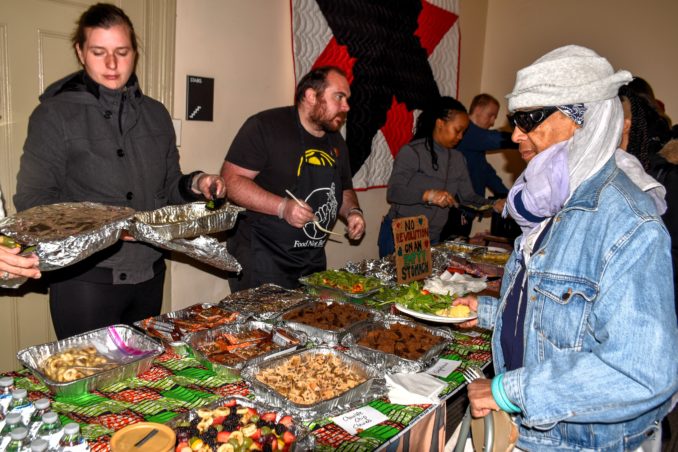Food Not Bombs Solidarity vs. COVID-19
“Mutual aid” had become a buzzword on many lips when people began to realize, despite the steady stream of government lies, that COVID-19 was a real threat. With over 22 million U.S. workers already laid off, many are worried about meeting basic needs for food. Workers World Philadelphia spoke with Cindy Lou, an organizer with Food Not Bombs Solidarity, about how they are addressing this crisis. The organization has an established and respected reputation for providing food for Philadelphia activists’ events and weekly community food distributions. The coronavirus has not stopped their work.
Workers World: Can you tell us something about your organization?
Cindy Lou: The Food Not Bombs organization has been doing mutual aid for 40 years. There are four chapters of FNB in Philadelphia: West Philly FNB, North Philly FNB, South Philly FNB and FNB Solidarity, which I am a member of.

Serving after April 30, 2018, court action to free Mumia. Photo: Joe Piette
Unlike a lot of other organizations which had to scramble to set up systems, we already had volunteers, transportation, supply chains and locations in place. All that was needed was to set it in motion!
WW: How does your operation function? What services do you provide?
CL: Usually we cook and serve weekly public meals. But we decided that bags of prepared and canned food would be much safer. We got in touch with a supplier and arranged a drop-off of 600 pounds of food per week.
Many of our members are confined to their homes, so we set up a mask-making group. A few of those masks go into every bag. We also made hundreds of bottles of bleach cleaner/disinfectant. One spray bottle went into each bag. We had set up fundraising apps, which we never had to use before, that enabled us to buy hundreds of bottles of liquid hand soap. Each bag gets a bottle.
Lastly, as we learned from the MOVE organization, we always print truthful information and put it in the bag. Printing is another activity people can do from home.
We also work in partnership with Philly IWW [Industrial Workers of the World], Philly Trans March, Socialist Rifle Association, SHARE Food Program, Philly REAL [Racial, Economic and Legal] Justice, For the People and Revolutionary Abolitionists Movement.
WW: Since we have enjoyed food provided by FNB Solidarity, it is clear this must involve some in-person contact. How does this work with COVID-19 restrictions?
CL: As we assemble these bags, working outdoors when possible, we try to practice social distancing and use liberal amounts of the hand sanitizer we made. We always wear masks and gloves.
Once a week, six volunteers go to a public area, usually a busy transportation hub, set up a table, sanitize it and wipe it down. We then give out 80 bags to community members who pass by. Our volunteers are a mix of people from all walks of life — Black, white, Asian, a wheelchair user, young people, elders and trans.
WW: Besides food, what other mutual aid do you provide?
CL: By forming partnerships with many other groups, we had access to surgical masks. We bought hundreds, and volunteers gave these to hospitals, a public health clinic and even workers at an Amazon store. While driving around the city, we distributed masks to UPS, FedEx, Uber, taxi and post office drivers, sanitation workers and supermarket cashiers, if they needed them.
Since many money-grubbing employers do not support the workers, we are supporting them. One member, who has stored the masks we purchased, drops them from their apartment window to our delivery people out front.
We are also continuing to support four shelters a week with donations from a local grocery store. In this way, we reach out to those people whom society has marginalized: trans people, sex workers, houseless people, drug users and people in recovery from substance abuse.
Our chapter has an incarcerated contingent which we support as best as we can, both monetarily and legally. We are worried and outraged that the mayor of Philadelphia and the governor of Pennsylvania refuse to #LetOurPeopleGo and decarcerate the prisons and jails during this COVID-19 crisis.
We don’t know how long this will last. We don’t know if it’ll get better or worse. Whatever happens, we will adapt, and we will be there.

